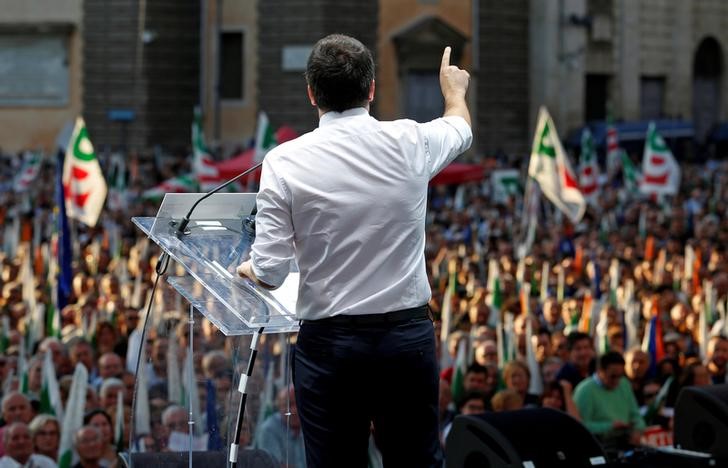By John Geddie
LONDON (Reuters) - Italian bond yields spiked to their highest levels in over a year on Monday, spurring a widespread bond sell-off, after Prime Minister Matteo Renzi suggested he may not stay on if he loses next month's referendum on constitutional reform.
Underlying bets that the policies of U.S. President-elect Donald Trump could push up inflation are feeding a global bond rout, but Italy stands out as one of several euro zone countries facing political tests in the coming months.
Renzi has recently declined to comment on earlier pledges to resign in the case of a defeat, saying a discussion of his own future deflected attention from the merits of the reform.
But, asked in a radio interview what he would do if the "no" vote won in the Dec. 4 referendum, he said: "If I have to stay on in parliament and do what everyone else has done before me, that is, to scrape by and just float there, that does not suit me."
Polls show the "no" vote firmly in the lead. Trump's unexpected victory in the U.S. election on Nov. 8 could make it even harder for Renzi to prevail, by bolstering support for his populist rivals in the 5-Star Movement.
"If you talk to Italian investors, a lot of them will say that nobody else other than Renzi can govern in Italy. This is the reason why there was a widely held view that Renzi, in the end, would stay on," Natixis fixed income strategist Cyril Regnat said.
Italian 10-year yields rose 18 basis points to 2.15 percent
Thirty-year equivalents rose around 20 basis points to 3.34 percent, their highest since July 2015, before settling back to 3.18 percent in what was a volatile day in euro zone bond markets.
The gap between 10-year Italian yields and benchmark German equivalents
The referendum has also widened divisions in Renzi's Democratic Party (PD). Political commentators have speculated that if he does step down after a "no" vote, he would then push for early elections in 2017.
That raises the risk of a populist backlash in Italy, like the one that propelled Trump into power and Britain on its way out of the European Union. Upcoming elections in Austria, the Netherlands and France could also bring about major changes in the political landscape.
More broadly, investors are reasoning that the value of bonds will be eroded over time if Trump's promises of heavy infrastructure investment and deep corporate tax cuts boost global inflation.
German 30-year bond yields rose some 10 bps to briefly break through the 1 percent mark for the first time in more than six months on Monday
A key market gauge of euro zone inflation - the five-year, five-year forward rate - climbed 3 bps to hit 1.59 percent
"It is a continuation of this recent trend. There are still these expectations that inflation could go up if the U.S. takes a more expansionary fiscal stance," DZ Bank strategist Daniel Lenz said.

It is too early to say what measures Trump's administration will push or how it will fund them, but Republican control of both houses of Congress gives him great flexibility.